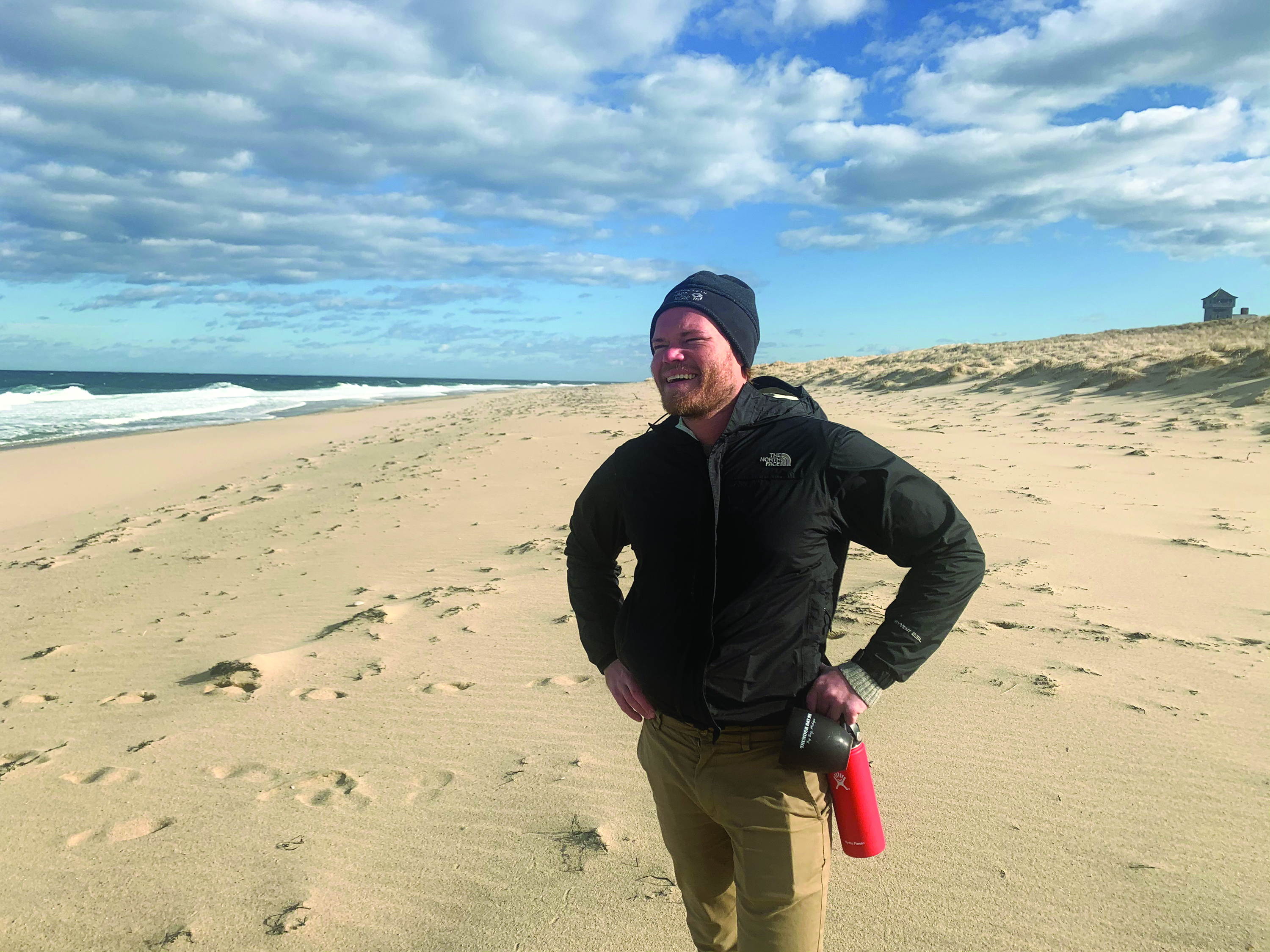The dazzling sunshine is deceptive: not many would find Provincetown’s windswept Race Point Beach inviting on this freezing mid-December day. Kevin Fitchett ambles up the beach and offers a winsome smile and a sincere apology for suggesting this inhospitable meeting spot. He has brought with him a thermos of hot coffee and two mugs.
The charming dichotomy Fitchett projects — rugged and thoughtful — seems to answer the challenge he jokingly throws out as he plops onto the cold sand: namely, to capture the “essence of his spirit.” It’s not at all surprising that Fitchett recalls Nobel laureate Seamus Heaney’s words when asked about his personal poetics. “Necessary poetry,” the Heaney quote goes, “touches the base of our sympathetic nature, while taking in the unsympathetic nature of the world to which that nature is constantly exposed.”
“This would be a good place to die,” Fitchett says, pausing as he considers the wintry horizon. Then he laughs. “Hypothermia is a good way to die, they say — right?” He most recently swam here on Thanksgiving morning, he says. “Once you get into the water, your body goes numb and you’re fired up. It makes your entire day great.” He laughs again. “I don’t like to talk much. Although I like to show off when I read.”

And read he will, along with another writing fellow at the Fine Arts Work Center, J.W. Ptacek, in the center’s Stanley Kunitz Common Room in Provincetown next Thursday. Fitchett says his material will be autobiographical poems he has written, work that focuses on “the most important things I know — masculinity that becomes toxic, marriage and the loss of it, wilderness and the loss of it, the avarice of average Americans, and also redemption wherever one happens to find it.” His voice shifts as he adds, “I’ve recently lost someone — someone who’s still alive and out there somewhere without me, whom I loved more than I really understood. And this is what I’m writing about in my poetry and fiction. It’s all I can bear writing about right now. And I can hardly bear it.”
Living exposed to the beauty and extremes of nature is not new to Fitchett, who is also working on an autobiographical novel that draws from his experiences in Provincetown. He drove to Cape Cod from his off-the-grid cabin in the Cascades in the Northwest, where he is surrounded by grizzly bears and cougars. His 70-pound poodle did not make the trip with him, nor is its name “Fitchett,” as the Independent erroneously reported in a recent roundup of this winter’s FAWC fellows.
“That was quite hilarious to read, considering my autobiographical remit here,” he says. “I, Kevin Fitchett, am not that kind of autobiographical poet psycho. Not yet, at least.” The poodle, named Javi, may or may not join him in Provincetown in the new year.
Getting the FAWC fellowship in Provincetown is the realization of a long-held goal for Fitchett. “This is the mecca of writing,” he says. “I have friends who came through here. The best writers in the world started here.” Then he chuckles. “But I didn’t realize it would be this beautiful and this distracting here.” He animatedly describes clamming, collecting oysters and moon snails, emptying periwinkles with toothpicks, and running in the Beech Forest.
Fitchett mentions the warm welcome given the FAWC fellows by such locals such as the town’s shellfish constable, Stephen Wisbauer. “Constable Steve chided us for the grave-like clam-digging we were attempting and told us — demonstrated for us — the secrets,” Fitchett says. “He opened an oyster for me on the tidal flats and I sucked it down. He insisted on lending me his shucking knife and returning it to his worn-down Land Rover at my leisure. I wasn’t ready for the shellfish bodkin and demurred.”
Then he adds, “We live like ferals here. It’s very special, and I love it.”
Fitchett pauses and considers the sand swooping down in the wind to the shoreline. “When I come out to the ocean, I just lose it,” he says. “I start sprinting and want to run into the ocean. I sprint — I don’t run. I like to sprint. I sprint around town.” He bursts again into laughter. “The other day, I had this great moment. I run superfast, and it was pouring rain, and this guy pulled up to me in this truck and asked, ‘What’s wrong, man?’ And I said, ‘This is how I run.’ Then he looked at me suspiciously, because I had this bag in my hand. I’d gone to Angel Foods and bought hemp milk or something, and he looked at it like it was a purse. I said, ‘It’s not a purse. I didn’t steal this purse.’ That was a proud moment.”
Fitchett is not always so lighthearted about being a writer. “Every poem is a political act,” he says. “I’m quoting someone here, but I mean that. It is so difficult to survive as an artist. And in this political climate, where nearly one-half of the U.S. doesn’t tell or hear the truth, being an artist doesn’t seem far from actual risk, as it is in many places.”
Before building his cabin, Fitchett spent time in China and Mexico in order to be able to live cheaply while writing. “To pry open the space needed to be a good writer is so financially straining,” he says. Provincetown and FAWC have given him a reprieve, and for that he is grateful.
Sandblasted Verse
The event: Readings by FAWC writing fellows Kevin Fitchett and J.W. Ptacek
The time: Thursday, Jan. 9, at 6 p.m.
The place: Fine Arts Work Center, 24 Pearl St., Provincetown
The cost: Free



